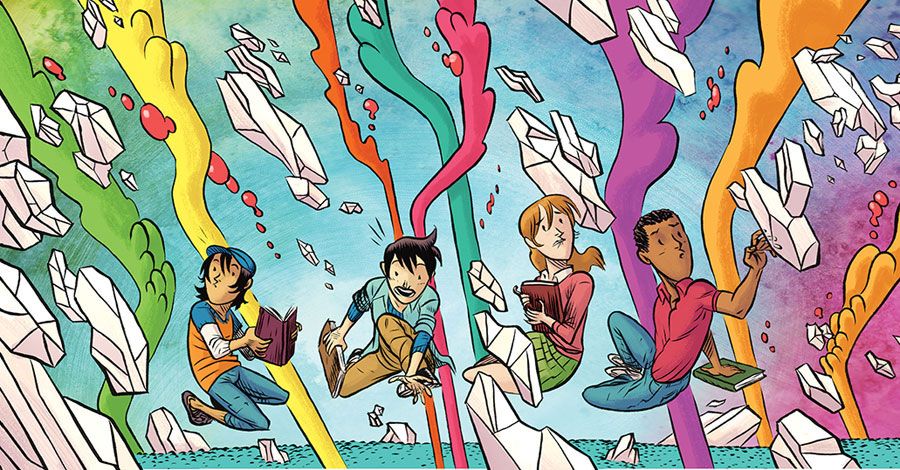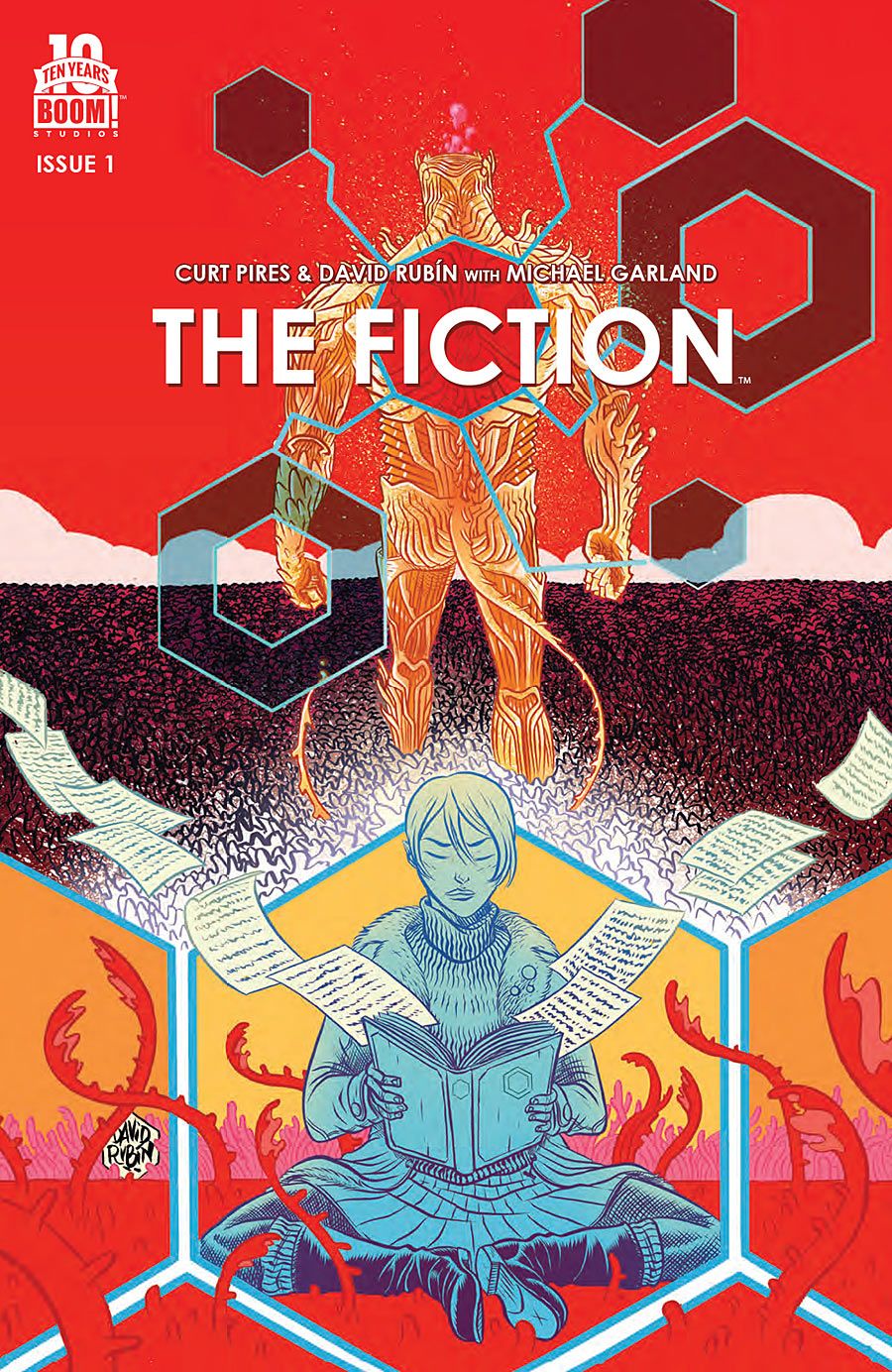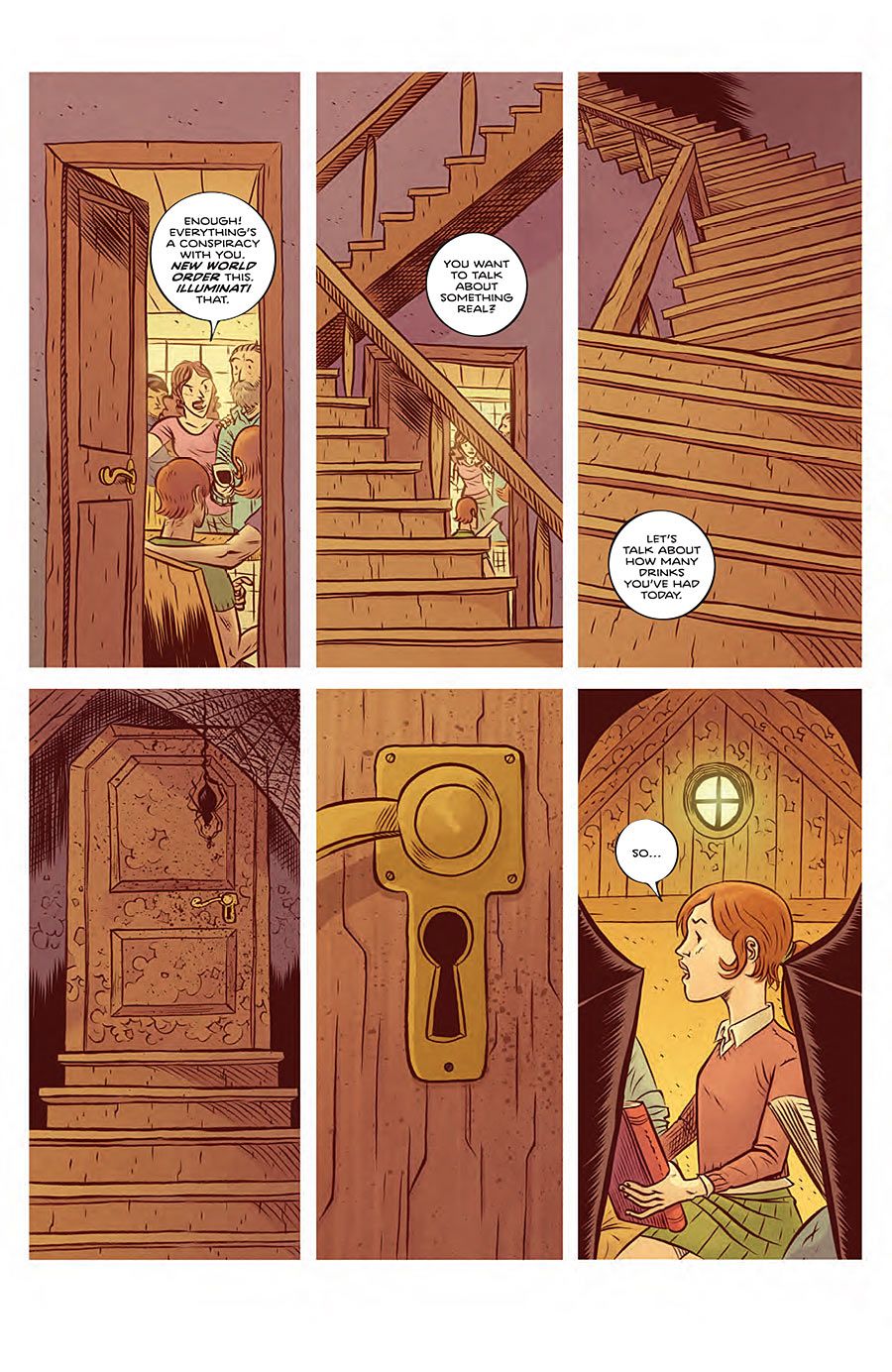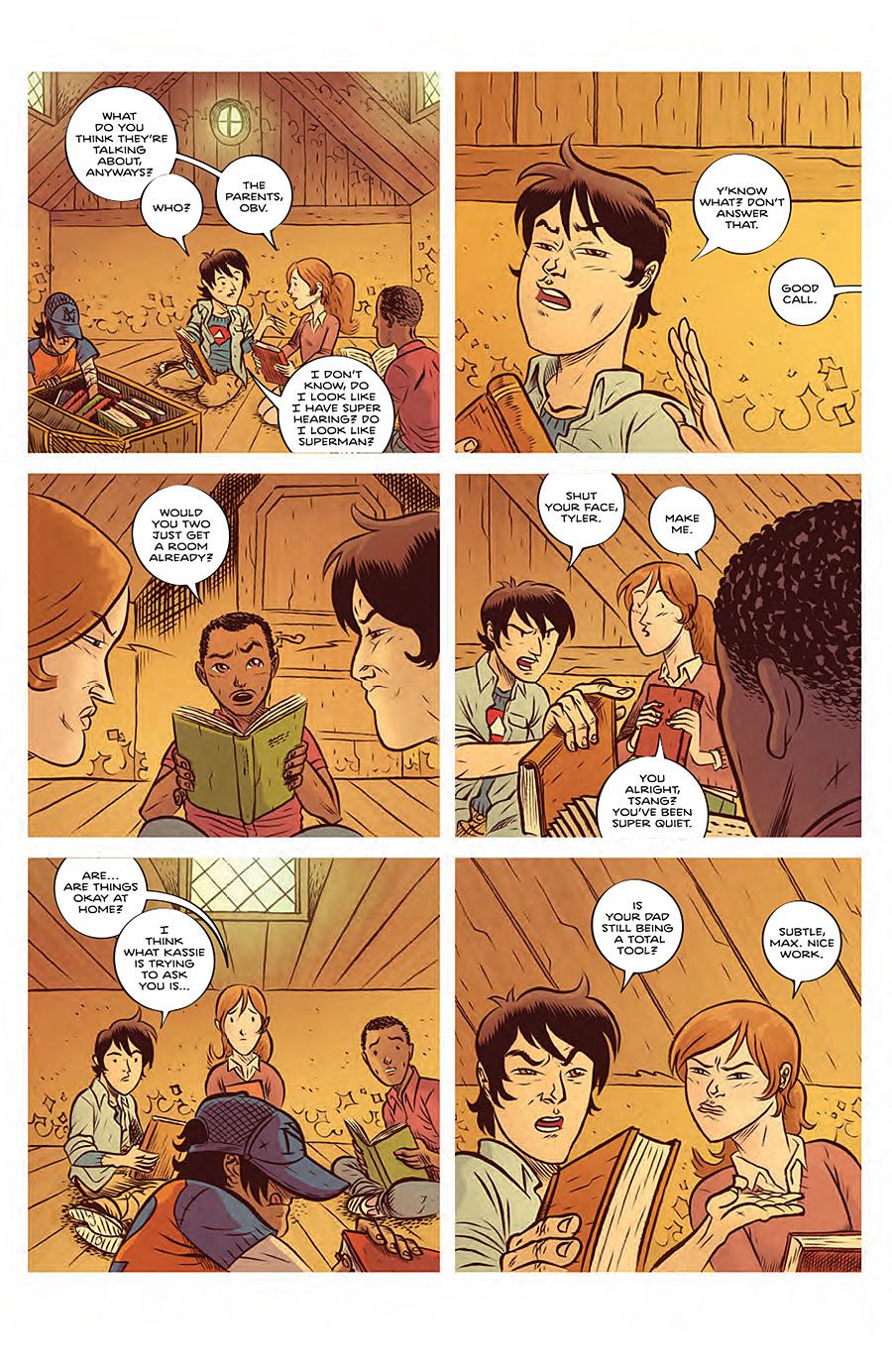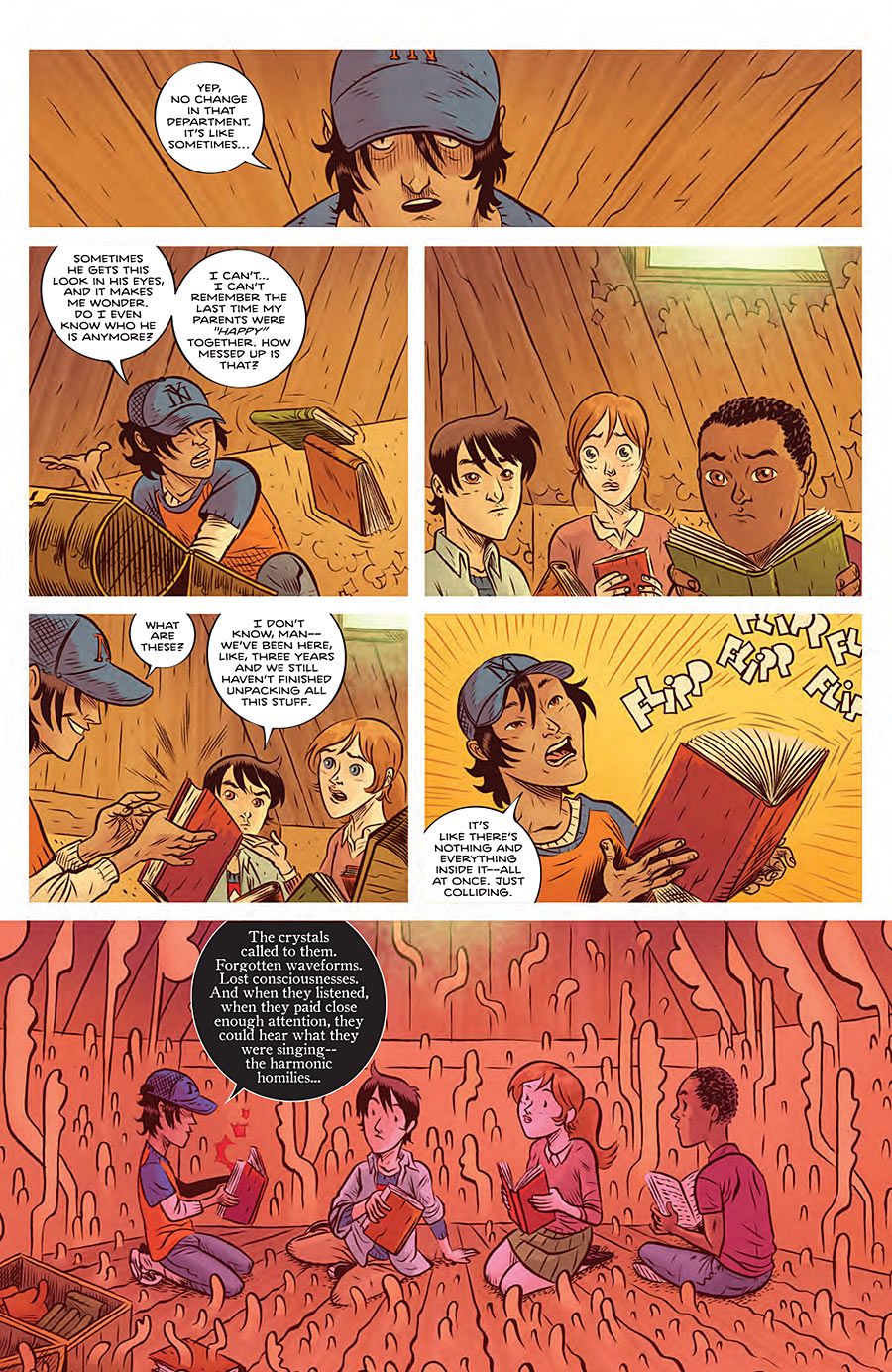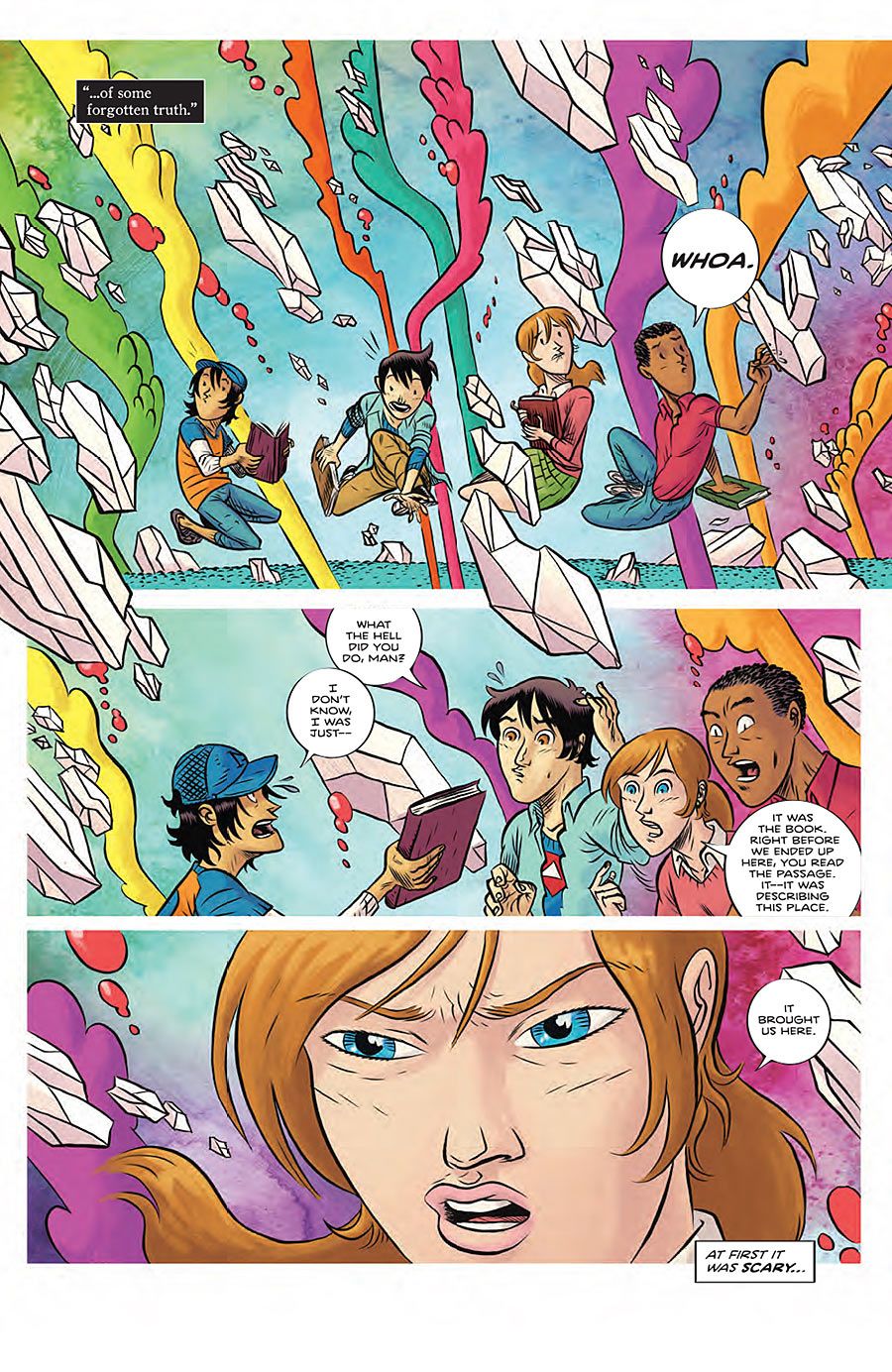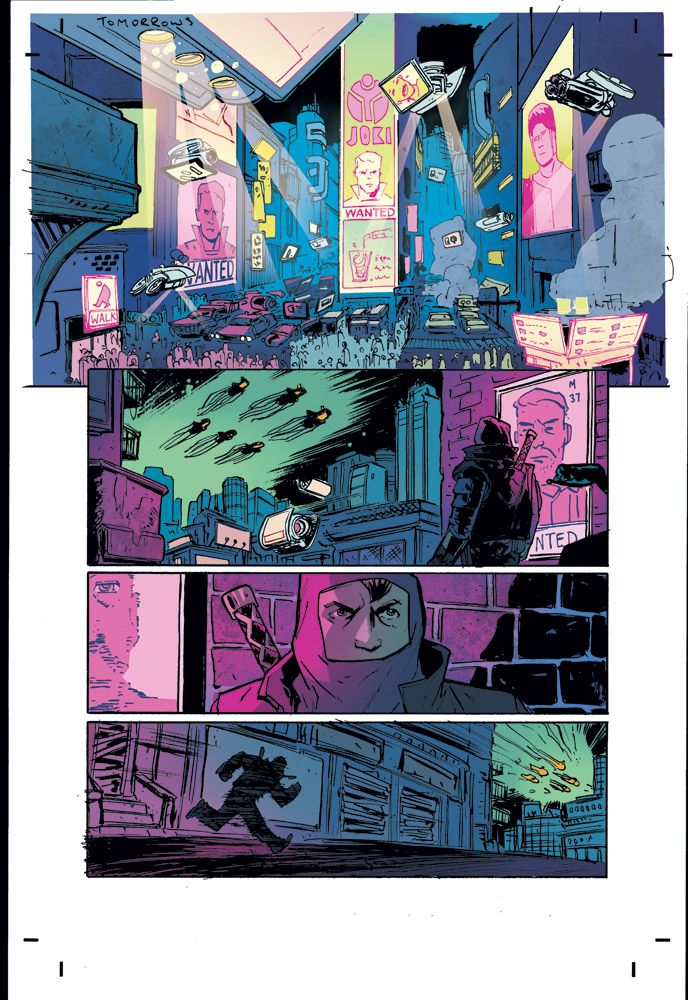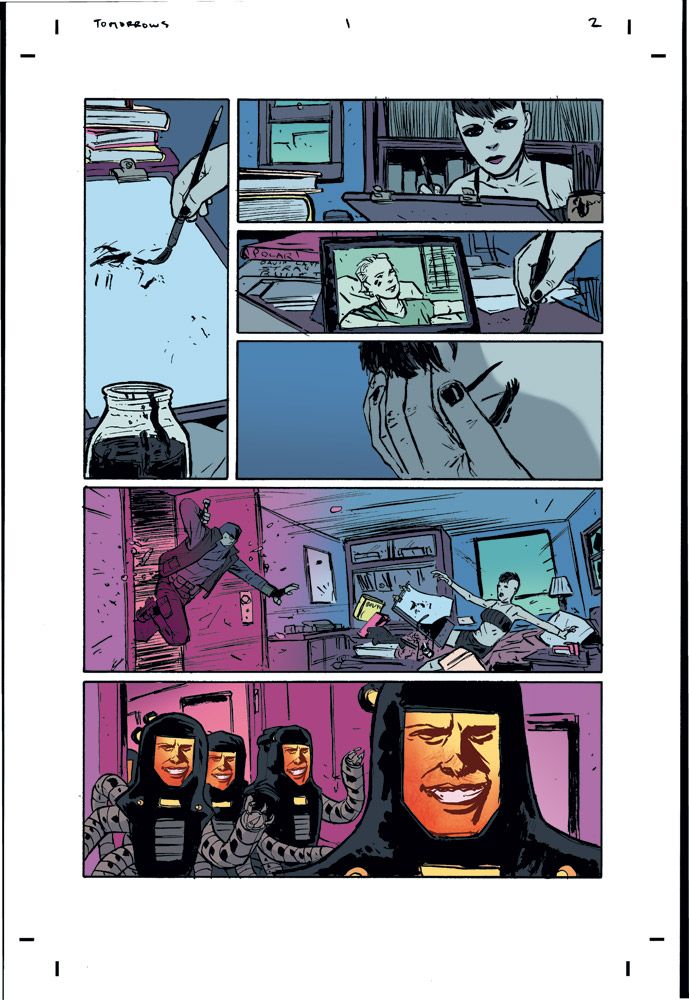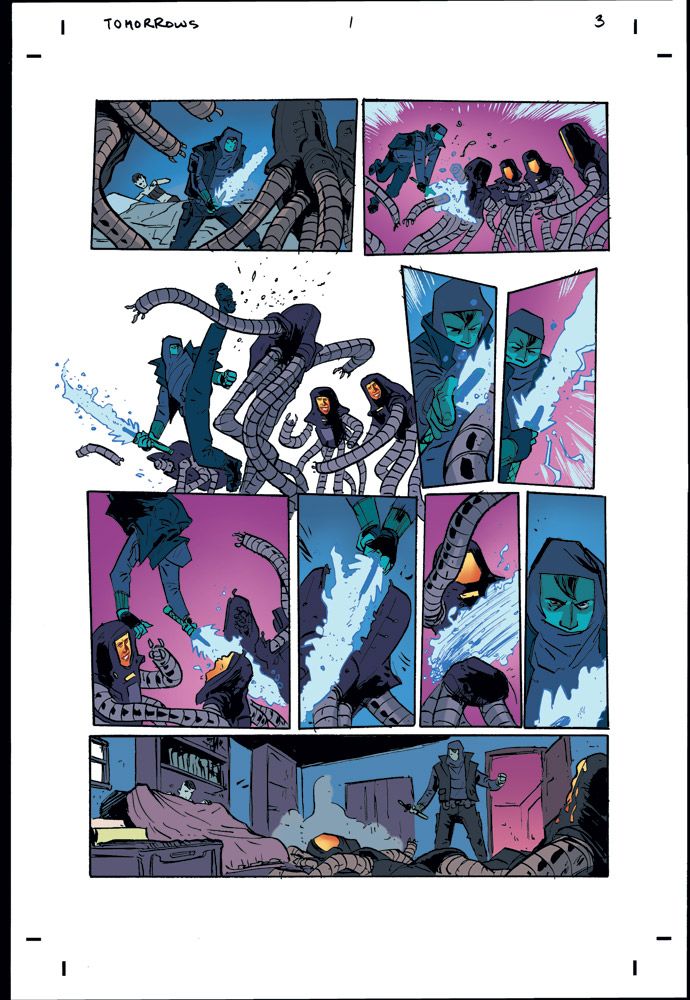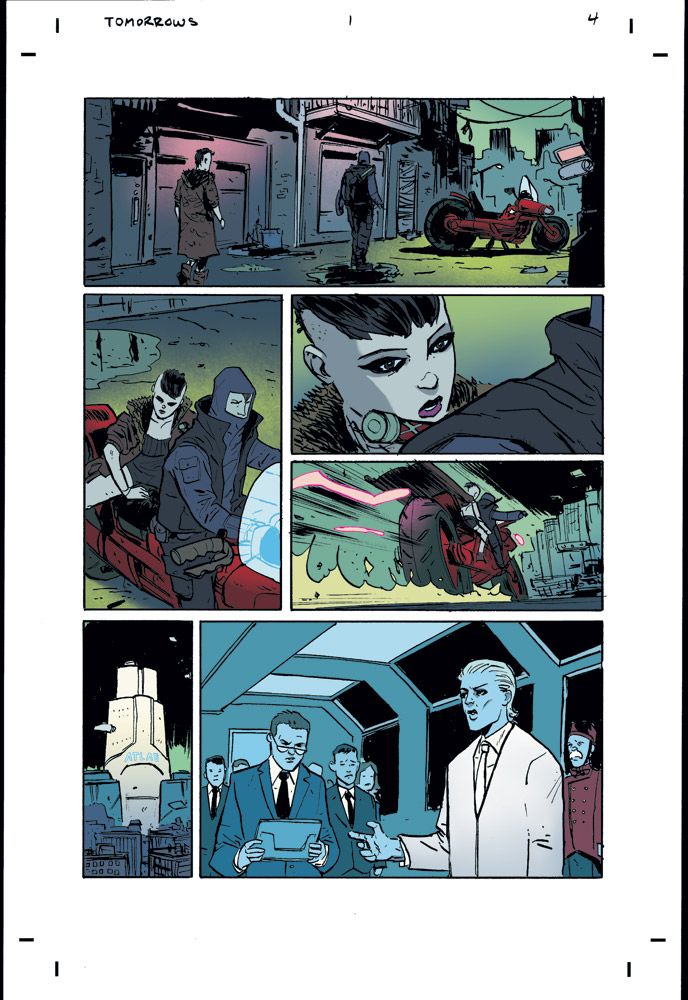In the early years of his comics career, Curt Pires placed a premium on short, strange and shocking work. But with his newest projects, the writer is looking to expand the scope of his storytelling to attack readers' notions of what stories and art are truly capable of.
Launching this week from BOOM! Studios, Pires and artist David Rubin's "The Fiction" follows a quartet of friends who, as kids, entered a surreal fantasy landscape via magical books. Now in their adult years, the wonder and trauma of those adventures are bearing down on them in frightening ways.
In July, "The Tomorrows" debuts from Dark Horse, a series written by Pires with art by an issue-to-issue rotation of artists starting with his "POP" collaborator Jason Copland. There, the titular band of rebels stake their claim to art supremacy in a dystopian future with a sprawling scope and corporately controlled culture.
CBR News caught up with Pires to discuss both books, digging into the ways his new series battle nostalgia, shock storytelling expectations and explore the themes of metafiction, rebellion and identity.
CBR News: Curt, I've seen you say that the idea for "The Fiction" was born from a dream. What happened in that dream, and how did the defining images your subconscious delivered to you morph into a story?
Curt Pires: The dream was quite strange and surreal. Myself and three friends were in a completely decayed Times Square, buildings rotting, falling apart, moss forming on them -- the Earth beginning to reclaim the city. Another human was floating far in the distance in the air and commanding this giant tsunami-like wave towards us. All of us were crouched over this book, trying to read our way out. For some reason, that was the only way we could escape. I woke up from the dream and wrote it down in my dream journal. The next day, I knew there was a story there -- I started writing.
The images got me thinking about the idea of a sort of "literal" escapism. What if you could read a book and transport yourself somewhere else? To another world? I ran with it.
At its heart, this story is about four people who connected as kids reading books together -- an idea I'm sure will prove universal to a huge portion of the readership. Why does the fiction of our youth provide a potent platform for an adult story, and how do you approach this without veering into nostalgia?
I think the books, the fictions we ingest as children, are so formative to us as adults. This is almost, like you're saying, just a hyper-literalized version of this. I also think the concept of nostalgia, like you mention, ties into this heavily. We're all constantly grappling with nostalgia. I mean, I know I am. I walk somewhere I've walked before, I go to somewhere I used to work, and all I remember are the good times. I catch myself doing this, and I have to remind myself that it wasn't all always sunshine and rainbows. It wasn't all fun. But I think that's just fundamentally how we're wired as humans. We're all chasing yesterday. We all want that one more chance to go back and do it all over again, to do it right.
"The Fiction" is, in a lot of ways, about the impossibility of this desire. Our characters can't go back. They can't ever fix what happened to them. So some of them run. Others of them learn to accept it. But in a big way, the book is how we process our past.
Let's talk about your cast. Of the original readers, Max, Kassie and Tyler have all attempted to move on with their adult lives after leaving Tsang behind in The Fiction. How does the series connect those two threads? Will we be moving back and forth between their younger selves and today, or is the construction of this story a bit more linear?
I don't think it will surprise anyone to hear me say we're not playing it straight. We're jumping around between the past and present throughout the issues. But I think he way I've structured it, it's not particularly disorienting. We're just building this massive story across two timelines at once. The reason it works? Because it's really all just one story. As we move forward people will see this.
If you couldn't read the tea leaves in the questions by now, it's kind of hard to talk about the basic story mechanics of this without getting into metafictional. So much of this premise seems to hinge on how we share stories, our collective cultural consciousness, and particularly the way stories we read when we're young affect us as we grow up. What about that kind of meta thread excited you most in putting together this series?
I think the thing that excited me most about the meta thread was the idea of exploring the concept(s) of stories in general, in a deep way. I mean, most of the time when meta elements are utilized in storytelling it's in a playful, tongue in cheek way. It can definitely be fun, and I've done this before. But with "The Fiction," I really wanted to crack things open and get deep and look at what lies at the heart of stories. What connects our narratives? What's the connective tissue? That includes descending down the rabbit hole of other metafictions -- specifically the works of Jorge Luis Borges. I drew major inspiration from "The Garden Of Forking Paths," and I think if readers play close attention there are some things beneath the surface of "The Fiction" that will call attention to that.
From the few pieces of art we've seen so far, the books that empower the magic of The Fiction almost remind me of the books in "Moonrise Kingdom" -- very strange Middle Grade fantasy novels that never existed, but that you kind of dreamed were around when you were a kid. There's a great tradition in those kinds of illustrated books where artists don't merely provide a picture for the writer but work to interpret their ideas in a new way. Norton Juster and Jules Feiffer. Roald Dahl and Quentin Blake. And on and on. How has David Rubin deepened the concepts of "The Fiction" with his take?
That's a great question. I think you nailed it. This isn't a case of David simply illustrating/rendering my script. David brought magic into the book. There's so many little things even just in the first issue that weren't in the script that David added, that really elevate it. More than anything though, I think David brought a sense of beauty wonder and fun into the equation. I had an idea of what "The Fiction" was as a place in my head, but once I started seeing his art, I started realizing that this is what "The Fiction" was. If you want to get really meta with things you could say David was a conduit for the fiction, a channel that it was using to communicate what it was to us.
"The Tomorrows" is set to arrive in July, and at its core, it's a "forward thinking" book in more ways than one. Let's start on the premise alone: this is a world where art has been outlawed, and to be frank, rarely is sci-fi written to address only the future. What about today's world and culture gave you pause enough to create this kind of future?
I was just thinking about the trends I'd been observing within society in regards to the treatment and valuing of the arts in general. I mean, I'm from Calgary, Alberta, and the big conversation here recently in this city that's basically built on Oil Money has been cutting arts funding to help alleviate a rather large budgetary deficit that exists due to incompetent government spending. And I look around this city, and it's already struggling to hold onto what little art scene it has. As a kid growing up here, even now, the art -- the beautiful weird shit -- is what keeps this city charming, what keeps it from being a total black hole of corporatism. So when I look at behavior like that -- when I reflect on it, it's not that easy to imagine a future where art has been outlawed.
On a deeper level, I think art has always been a way of expressing dissent. We make art to communicate dangerous ideas. To buck the societal narrative. Art can create and put dangerous ideas into the world. Ideas that are decidedly anti-corporate. If you're trying to run an oligarchy that's not something you're on board with.
We've already broadly experienced a death of what you'd call the monoculture in America, but somehow legitimate independent art movements seems to remain in short supply. The title characters of "The Tomorrows" are an explicit countercultural force. What subcultures and indie scenes help inspire them for you, or what common threads do you see in community/scene-driven art that helped you define this cast?
That's another really great question. I'm not even sure I buy into the idea of "scenes" at this point. It's weird to say, but almost every time I find myself interacting with a self-proclaimed art scene or "indie" scene of some sort, I mostly find myself staring at a bunch of people pretending to be something they're not. It's the year 2015, and I think maybe the problem I'm addressing here is the tendency of hipsters to want to come off as bohemian as a "scene" without creating anything or doing any of the work. It's like taking a snapshot of what they think is so cool about art, and they try and co-opt it. It's obviously a sore spot for me.

That's not to say there aren't scenes that influenced me. We just have to go way further back. Warhol's factory. The Warhol superstars. Boys and girls shooting up and making art/love with one and other. Exploring the boundaries of reality. The beat generation. Burroughs. Kerouac. Ginsberg. Staring into the fucking core of reality at the time your existing and trying to make sense of it.
The cast of this book seems to be expansive, ranging from a charismatic leader type in Claudius to a neophyte Zoey. Who did you gravitate towards to carry the story over the opening issues, and how does writing an ensemble piece change your task as a storyteller from the more "Main Character" focused stories you've done before?
The hard part about writing an ensemble cast is precisely what you're hitting on here: making sure that everyone gets their moments, both within the large context of hitting our plot points, but also in the context of making sure the reader cares. This is something I've been conscious of while crafting the issues. In some cases I get it right the first time, and in others it's a matter of doing another pass at the script and seeing if there's a way to improve things, to give everyone their moments.
On the creative side, one of the big hooks for the series is a rotating cast of artists, with a new collaborator joining you on each issue. What's it been like to start a story with a close collaborator from the past like Jason Copland and then push out into more unknown territory as you get deeper into the story?
It's been really fun. Having Jason on issue #1 was a bit of a safety net in a lot of ways. And I say that in the most flattering way. We had a ton of ground to cover in the first issue (it's about three issues of content condensed into one), and having a collaborator who I'm fluent with and have a shorthand with makes it a lot easier. I love working with Jason, so having him on this first issue was an easy choice.
As we move forward into the unknown, it's really just a case of me loving all the artists work, and trying to tailor each issue around their work, as well as hitting the larger plot points. It's really fun -- getting to sit back and say, what do I want to see Alexis draw? Ian? And dropping that into the script. It's embracing the beauty of collaboration and just going at it full throttle.
Like I said above, this story seems to have a sprawling landscape in terms of cast, locales and ideas. As you plot out this first six-issue experience, what has been the one idea that's kept the whole of "The Tomorrows" together for you in a way that will hopefully compel readers to support this series for a longer run?
The thing that's so interesting about this book for me is that while there are individual stories in the single issues, there is definitely an overarching narrative to the series, in a huge way. Talking about the book, doing press for it, it's clear to me that no one outside myself has any idea how huge the scope of the book is. I don't think people will really understand, or glimpse the full picture until issue #5 (Liam Cobb's issue), but once it comes into focus I suspect some jaws will touch the floor.
The only thing I can compare it to in terms of scope are the events that we see the big two do. These multiverse spanning, timeline shaking events. But this is a case of telling a story with that massive scope with complete 100% creative control and autonomy, and characters I can do whatever I want with. Are people ready for it? I guess we'll find out.
The Tomorrows are coming.
"The Fiction" #1 arrives this week from BOOM! Studios. "The Tomorrows" follows on July 8 from Dark Horse.

